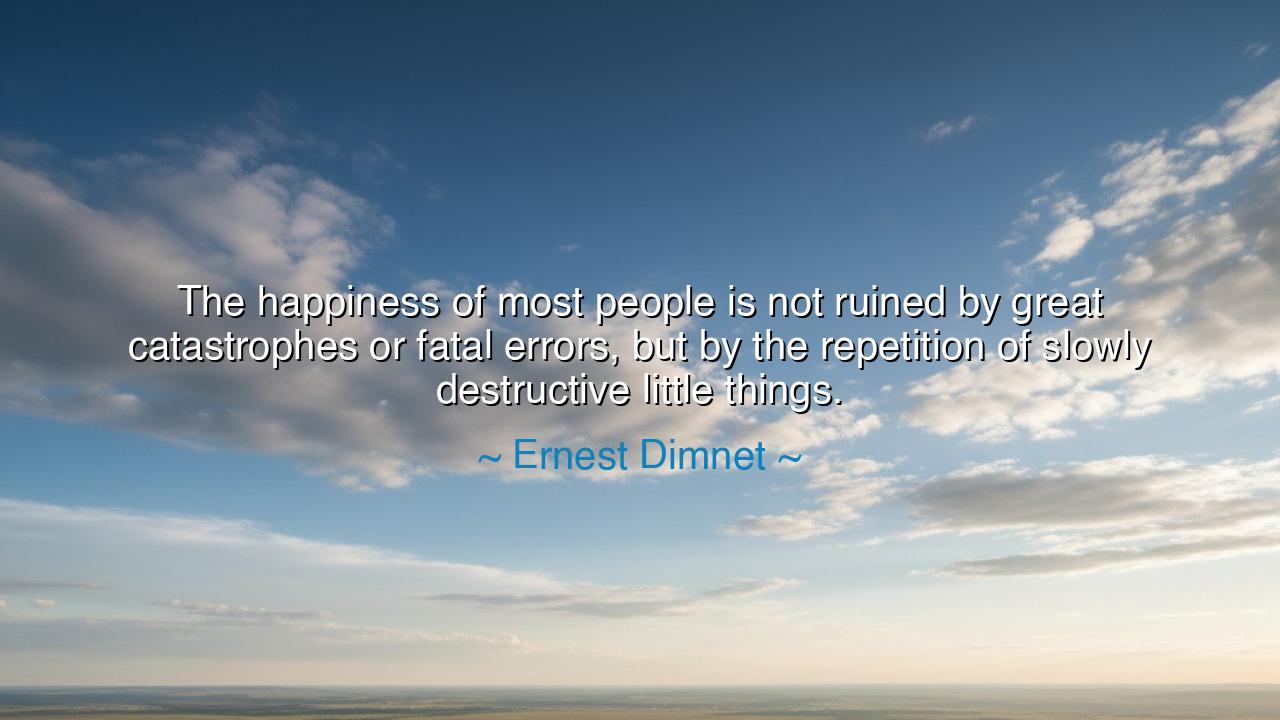
The happiness of most people is not ruined by great catastrophes
The happiness of most people is not ruined by great catastrophes or fatal errors, but by the repetition of slowly destructive little things.






Hear now the timeless wisdom of Ernest Dimnet, the French priest, philosopher, and writer, who spoke not from ivory towers but from the quiet study of the human heart: “The happiness of most people is not ruined by great catastrophes or fatal errors, but by the repetition of slowly destructive little things.” In this saying lies a truth as old as time, one that whispers through the ages: it is not always the storm that breaks the ship, but the constant drip that wears away the stone. The soul is seldom shattered by a single blow; rather, it erodes through the slow poison of neglect, resentment, and unguarded habits.
Ernest Dimnet, who lived through the turbulence of the late 19th and early 20th centuries, was a man who observed both the grandeur and fragility of human life. He was known for his book The Art of Thinking, in which he urged people to awaken their inner life — to think clearly, feel deeply, and live consciously. His insight into happiness came from seeing how men and women, though spared by great tragedy, often lost their peace through the slow decay of their own daily choices. He understood that few lives are destroyed by fate; most are undone by the little things — the unkind word left unhealed, the small bitterness allowed to grow, the daily indifference that deadens love.
When Dimnet speaks of “slowly destructive little things,” he warns us of the invisible enemies of the spirit: habits of mind that seem harmless but, over time, consume our strength. Worry, like a moth, eats away at the fabric of contentment. Complaints, repeated day after day, drain the joy from the heart. Neglect of gratitude turns abundance into emptiness. These are not the grand tragedies that the world notices — they are the quiet, creeping shadows that steal happiness drop by drop. The man who lives in irritation, the woman who feeds on comparison, the child who never forgives — all are undone not by destiny, but by choice repeated until it becomes chains.
History gives us many examples of this truth. Consider the story of the mighty Roman Empire, not felled in a single battle but corroded from within by complacency, greed, and moral decay. No great catastrophe struck at first; rather, the empire weakened slowly, its discipline lost, its virtues forgotten. The little corruptions of daily life — luxury without purpose, power without restraint — gnawed at its foundations until the whole structure fell. So too does the individual soul fall — not by one fatal mistake, but by the unending repetition of the small and unguarded.
Yet this truth, though stern, is not without hope. For if small things can destroy us, then small things can also save us. Just as a drop of water can hollow a stone, so can a drop of goodness fill a heart. One kind word each day strengthens the bond of love; one act of gratitude heals the spirit; one moment of patience averts a storm. The secret of preserving happiness, then, lies in the daily tending of the heart — in watching over thoughts, words, and habits as a gardener tends to his plants. For the soul grows not by sudden miracles, but by quiet, faithful care.
We must, therefore, become conscious of what we repeat. What are the little things that rule our days? Are they words of kindness or complaint? Are they moments of gratitude or grumbling? Each choice may seem small, but over time it shapes the landscape of our life. The ancients said that character is destiny, and character is nothing more than the sum of repeated acts. Thus, to guard our happiness, we must guard our daily habits, for they are the architects of our peace or the builders of our ruin.
So, my child, take this teaching to heart: beware not only of great evils, but of small neglects. Happiness does not vanish in thunder and lightning; it fades like twilight when we forget to nourish it. Mend the small cracks before they become fractures. Replace bitterness with forgiveness, idleness with purpose, resentment with gratitude. Each day, do one small thing that strengthens the light within you. For the same law that destroys also redeems — and the repetition of small good things can make the spirit unshakable.
Thus spoke Ernest Dimnet, the wise observer of souls: “The happiness of most people is not ruined by great catastrophes or fatal errors, but by the repetition of slowly destructive little things.” His words are a lantern for all who walk the path of life. Guard well the little things, for they are not little. In them lies the seed of both decay and deliverance — the quiet power to destroy or to save. Choose wisely what you repeat, and your happiness will not only endure, but deepen, shining like gold refined by the fires of time.






AAdministratorAdministrator
Welcome, honored guests. Please leave a comment, we will respond soon